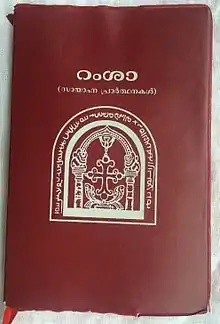Ramsha
Ramsha (Aramaic: ܪܡܫܐ) is the Aramaic or East Syriac Rite term for the evening Christian liturgy being followed as a part of the seven canonical hours (also known as liturgy of the hours) in the Syriac churches of the East Syriac tradition, including the Assyrian Church of the East of Iraq (including its archdiocese the Chaldean Syrian Church of India), the Ancient Church of the East of Iraq, the Syro-Malabar Church of India, and the Chaldean Catholic Church of Iraq. The latter two are Eastern Catholic churches in full communion with the Holy See of Rome.[1]

In the East Syriac tradition, a liturgical day begins with the Ramsha during evening at 6:00 pm.[2] This evening prayer is equivalent to the time of Vespers in the Latin or Roman tradition.
Canonical hours in the Syriac tradition

the Syro-Malabar Church
The Liturgy of the Hours was known by several names such as the Divine Prayers, Divine Office and Canonical Hours. In accordance with the Jewish tradition, the following are the seven times of prayer in the Syriac Churches:
- Ramsha at 06:00 pm
- Suba-a at 09:00 pm
- Lelya at 12:00 am
- Qala d Shahra at 03:00 am
- Sapra at 06:00 am
- Quta'a at 09:00 am
- Endana at 12:00 pm
- D-Bathsha Shayin at 3:00 pm[3]
See also
References
- Fr. Varghese Pathikulangara CMI (2011). Divine Praises in Aramaic Tradition (PDF). Kottayam: Denha Services. p. 8-12. ISBN 978-93-81207-02-4.
- George Percy Badger (1852). The Nestorians and Their Rituals. Kurdistan: Joseph Masters. p. 16.
- http://www.nasranifoundation.org/books/pdf/DivinePraisesinAramaicTradition.pdf
